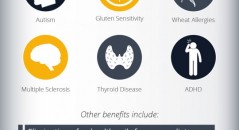 To grow up strong and healthy, children need proper nutrition. More research suggests that elements of our food supply can be surprisingly low in quality nutrients. This article covers the three most common nutrition deficiency found in children and what you can do to prevent it.
To grow up strong and healthy, children need proper nutrition. More research suggests that elements of our food supply can be surprisingly low in quality nutrients. This article covers the three most common nutrition deficiency found in children and what you can do to prevent it.
Three Nutritional Deficiencies in Children
The most commonly found nutrient deficiencies are usually food-related. Occasionally, the deficiency is present from other causes. As always, if you believe your child has a nutrient deficiency, be sure to consult a pediatrician.
Iron Deficiency
Iron is crucial for transporting oxygen from the lungs throughout the body. According to a study performed by Seattle Children’s Hospital and the University of Washington, iron deficiency is one of the two most common deficiencies for growing children.
Consistent tiredness (lethargy), high illness susceptibility and irritability are a few common symptoms of microcytic anemia, the medical term for iron deficiency. If left untreated, iron deficiency has been linked to ADHD and ADD.
Children at high risk for iron deficiency include premature babies, babies with a low birth weight, children in poverty, obese children, and infants fed solely non-iron fortified formula. For dietary prevention of iron deficiency, eating good sources of iron such as vegetables, legumes, nuts and seeds, meats, and dried fruit can be enough. If a doctor diagnoses an iron deficiency, it can be treated with an iron supplement.
Vitamin D
The second most common deficiency is vitamin D. For growing children, vitamin D is incredibly important. It contributes to brain, cardiovascular and bone health as well as helps regulate hormones and blood sugar. Vitamin D is also critical for absorption of calcium in the GI tract.
Some of the best food sources for vitamin D include liver, egg yolks and fish, especially fatty fish. The best source of vitamin D is the sun! As incredible as it may sound, vitamin D needs can’t be met solely from diet.
Children at high risk for vitamin D deficiency include those breast-fed without supplementation of vitamin D, vitamin-D deficient breast-feeding mothers, and those who receive low sun exposure. If you live in a low sunlight area, your doctor may recommend taking a vitamin D supplement.
Omega-3 Fatty Acids
Diets low in omega-3 fatty acids have been linked to depression, asthma, ADHD and type II diabetes! Research shows that these fatty acids are crucial for cardiovascular health. If your child is getting few omega-3 rich foods, they could be at increased risk for some of these conditions.
Luckily, omega-3’s are loaded in foods like fatty fish, avocados and walnuts. Your child doesn’t like those foods yet? There are omega-3 supplements available and your pediatrician can make a suggestion specifically designed for kids.
For growing little ones, proper nutrition is very important. Make sure they’re eating a diet full of whole foods and avoiding processed and refined food choices. In some cases, diet may not be enough. Always consult a doctor if you are concerned about a potential nutrition deficiency.






